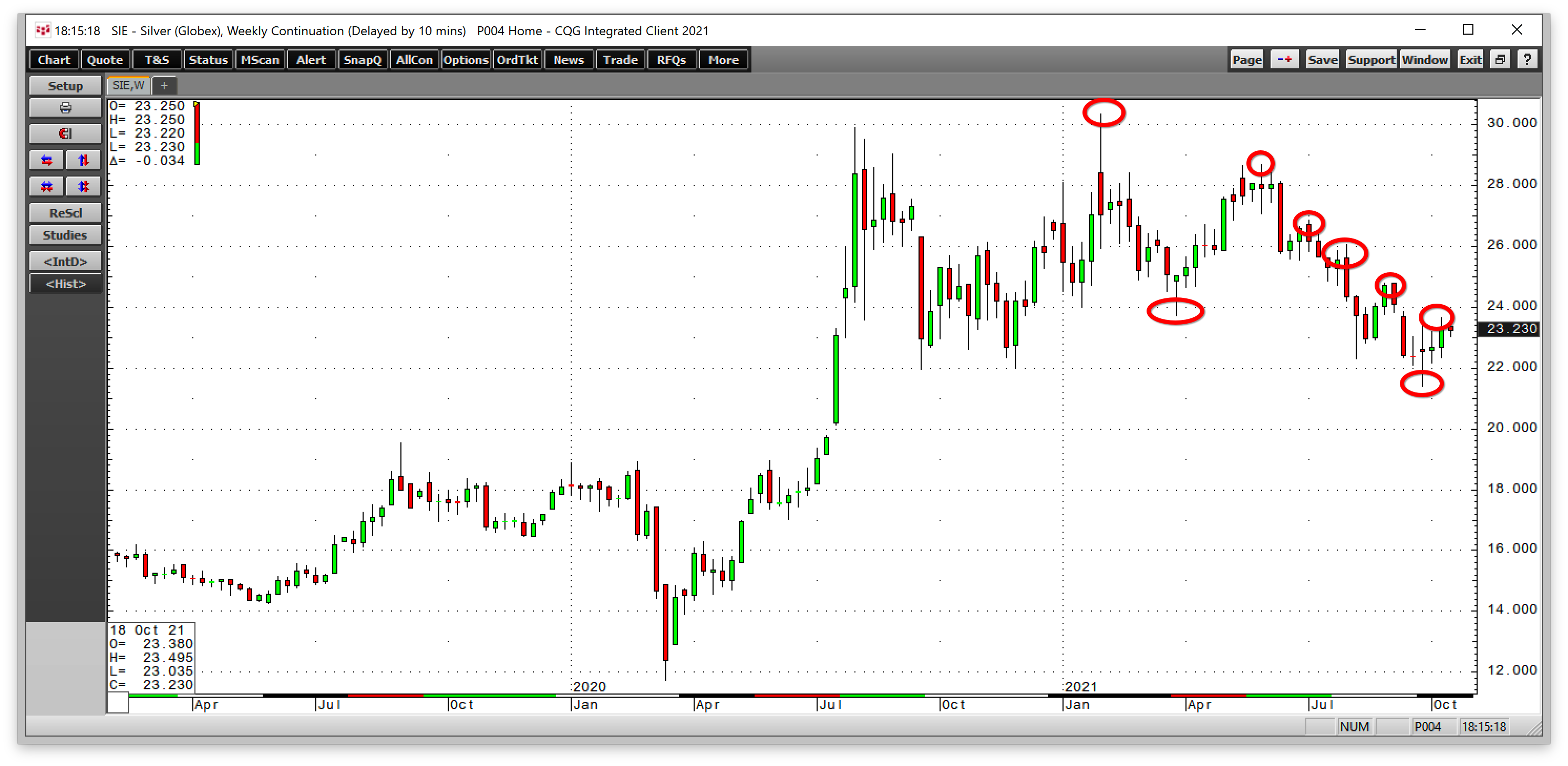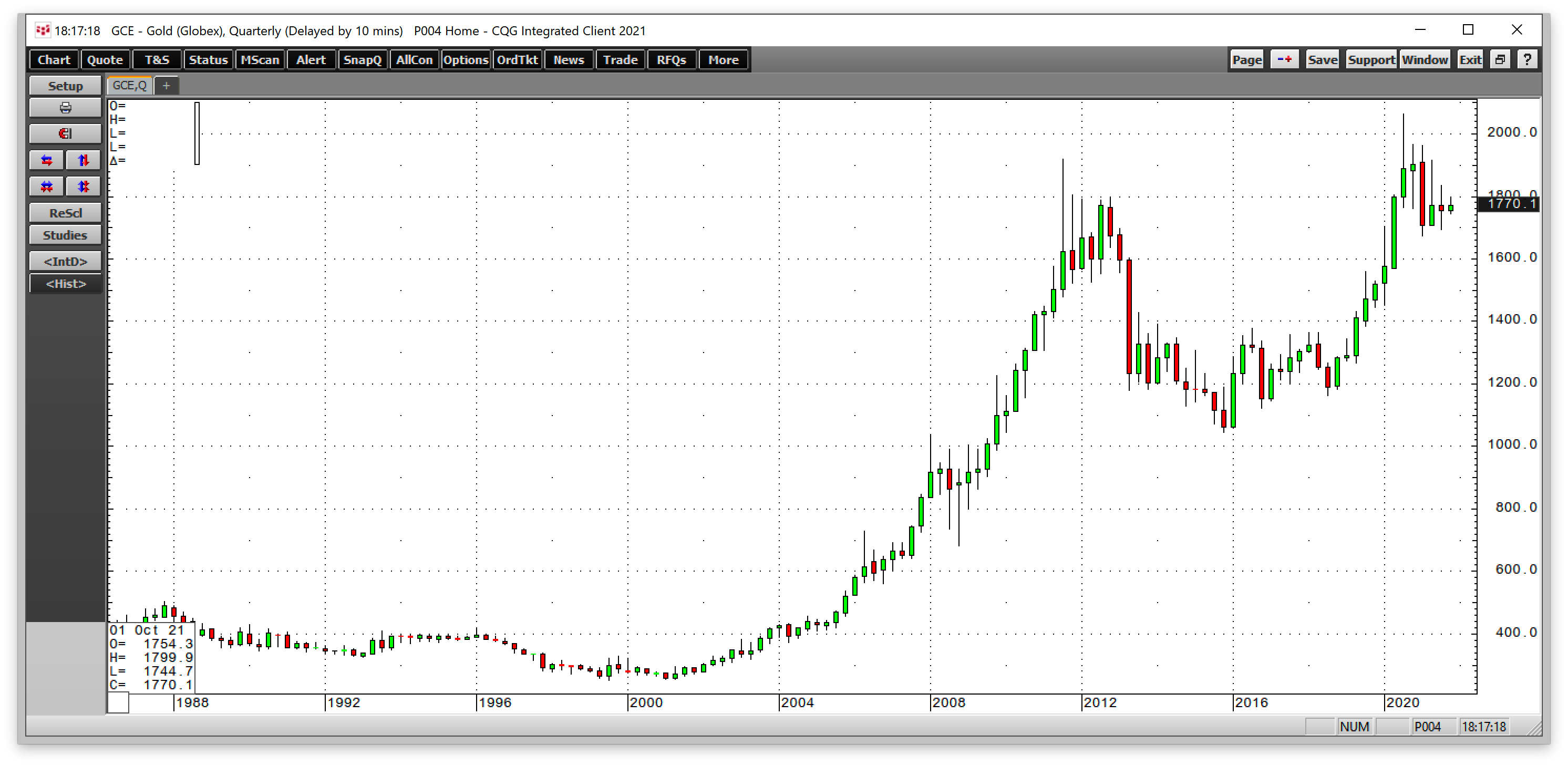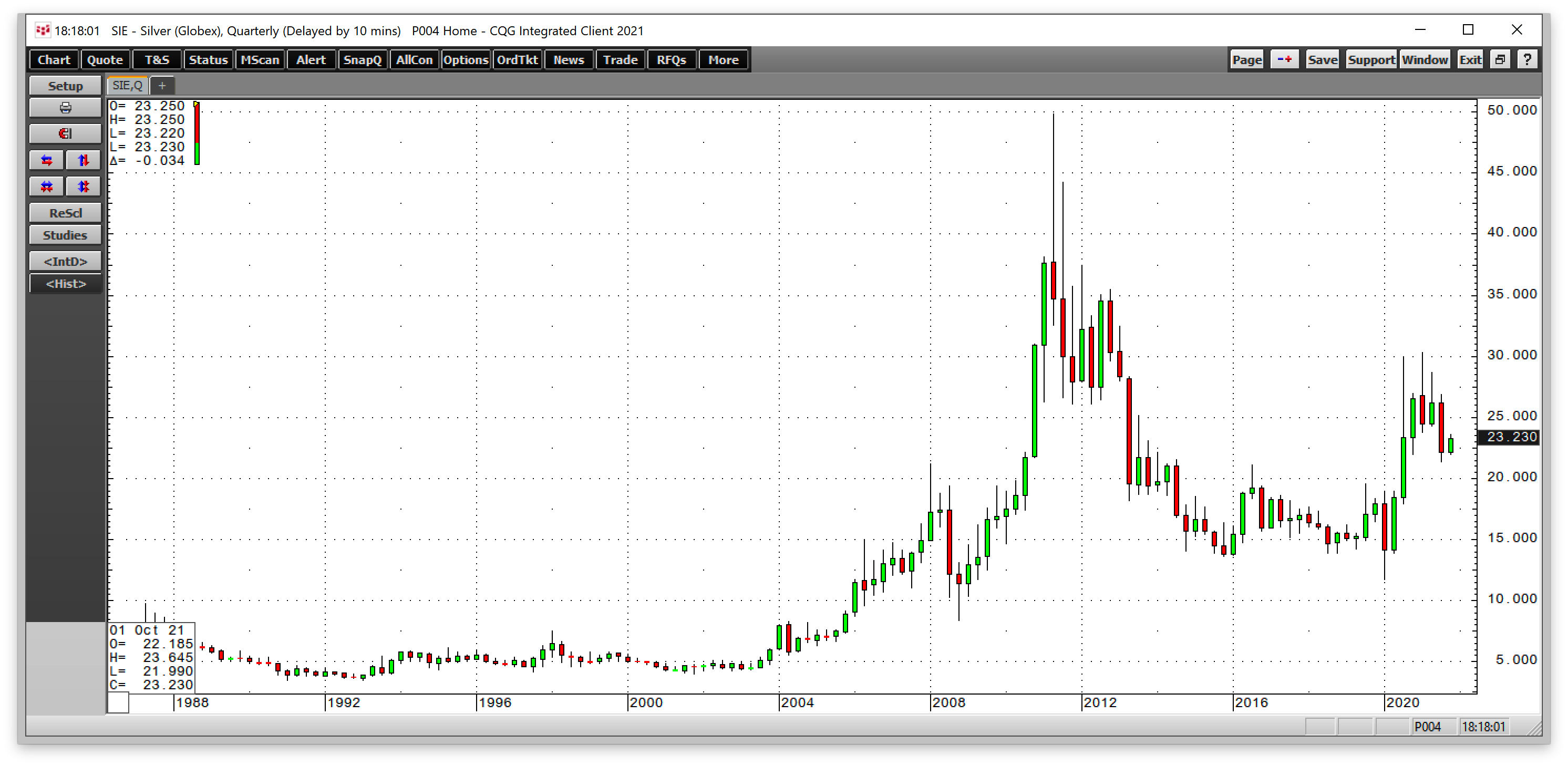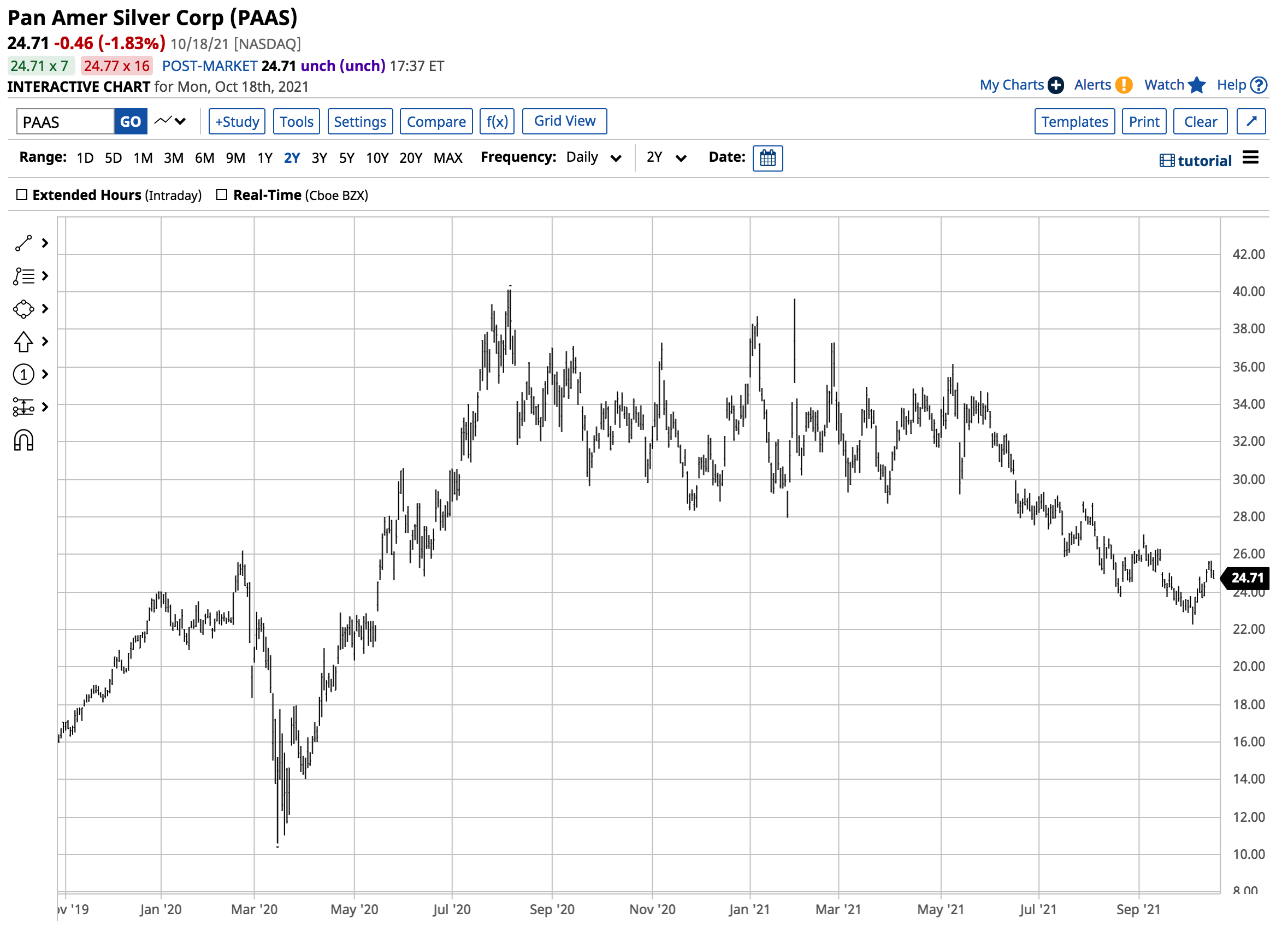United Homes Group stock plunges after Nikki Haley, directors resign
This article was written exclusively for Investing.com
- Silver outlook is awful
- New lows for 2021
- Buying dips is the best approach
- Producers tend to provide leveraged exposure without time decay
- Pan American Silver a leading producer
Silver is a highly volatile precious metal that tends to move higher or lower on the back of investment demand. It's a byproduct of gold, copper, lead, and zinc production.
Most silver is derived from the ores. Primary silver production is the exception instead of the norm when it comes to annual supplies. Only around 28% of output comes from primary silver mining, while 72% comes from byproduct mining projects.
Silver reached its modern-day, all-time high in 1980 when the price hit $50.36 per ounce as the Hunt Brothers attempted to corner the silver market. After years of depressed prices, silver exploded to a slightly lower peak in 2011 at $49.82 per ounce.
The most recent high came in early February 2021, when the price reached $30.35 per ounce. Since then, silver has made lower highs and lower lows, but the price remained above the $20 level at the end of last week. Silver tends to experience explosive and implosive price action.
While silver futures can be highly volatile, primary silver mining companies experience even more price variance. Silver miners tend to outperform the metal’s price when it rallies and underperform during price corrections on the commodity. Pan American Silver Corporation (NASDAQ:PAAS) is one of the world’s leading silver mining companies.
Silver has been under pressure. Buying the white metal or other precious metals on price weakness has been the optimal approach over the past years. If the pattern continues, this could be the perfect time to consider adding PAAS to your portfolio.
Silver outlook is awful
In 2021, the nearby COMEX silver futures contract has traded from $21.41 to $30.35 per ounce. The high came in early February, and the low in late September. On Oct. 15, nearby December silver futures settled at around $23.25 per ounce. The trend is always your best friend in markets, and it remains bearish in silver. 
Source: CQG
The chart above shows the pattern of lower highs and lower lows in the silver market over the past eight months, since the early February 2021 high. Silver was trading $7.10 below the 2021 high and $1.84 above the year’s low as of Oct. 18.
New lows for 2021
Silver reached new lows at the end of Q3. The price fell to $21.41 on Sept. 29 and settled at $22.047 on Sept. 30. Silver declined by 15.74% in the third quarter, and the price was 16.53% lower than the level on Dec. 31, 2020, on Sept. 30.
Silver fell to new lows on the back of a rising dollar and the prospects for higher US interest rates, a bearish combination for precious metals. Silver is not the only precious metal that has suffered from bearish price action over the first three quarters of 2021:
- Gold was 7.29% lower than the 2020 closing level on Sept. 30.
- Platinum fell 10.96% over the period.
- Palladium futures were 22.58% lower over the first three quarters of this year.
The most significant factor for the path of least resistance of silver futures is sentiment. Investment demand drives the metal’s price. In 2021, market participants have had more opportunities in other asset classes when compared with precious metals. The ascent of cryptocurrencies has likely taken the shine off silver and the other precious metals as stores of value. The energy sector has soared along with base metals and industrial commodities.
Silver, gold, and other precious metals became forgotten assets in Q3 2021.
Buying dips is the best approach
Meanwhile, since the turn of this century, buying silver and gold during periods of price weakness has been the optimal approach. 
Source: CQG
The quarterly chart shows that gold has offered those who purchased the yellow metal on a scale-down basis attractive returns since the late 1990s, after falling to a low of $252.50 per ounce in 1999.
Silver has been a far more volatile ride for those buying during selloffs, as we learned in 2020. 
Source: CQG
The quarterly silver chart shows the precious metal reached its bottom at $4.015 in October 2001 and rose to a high of $49.82 in 2011. While gold made a higher high in 2020, silver only reached its most recent peak at $30.35 in early 2021.
Meanwhile, silver plunged from nearly $19 in early 2020 to a low of $11.74 as the global pandemic gripped markets. The price turned higher and nearly tripled at the 2021 high. At the end of last week, silver was just under double the price at the March 2020 low, even though it is sitting close to the lows for 2021.
When buying silver during price corrections, it is critical to leave lots of room to add on further weakness. Silver loves to defy technical support and resistance levels as the price moves to bottoms and tops that can be irrational, illogical, and unreasonable.
Producers tend to provide leveraged exposure without time decay
With under 30% of the world’s annual silver supplies coming from primary production and wild price volatility, shares of silver mining companies experience boom and bust periods. Therefore, silver mining companies tend to outperform the price action in the silver futures market during rallies and underperform when the price declines.
Silver mining companies move like leveraged ETF and ETN products, but they offer a distinct advantage. Leveraged derivatives suffer from time decay as they use options to magnify the price exposure. Silver mining companies do not experience time decay, known as theta, as the leading companies remain in the business of extracting silver from the earth’s crust during the market’s bullish and bearish cycles.
Leverage without time decay could be the most attractive characteristic of silver miners.
Pan American Silver a leading producer
PAAS explores for, develops, extracts, processes, refines and reclaims silver, gold, zinc, lead, and copper from mines in Canada, Mexico, Peru, Argentina, and Bolivia. The company has been around since 1979.
In 2020, Pan American Silver was a top-ten silver producer with 17.3 million ounces of production.
At $24.71 per share on Oct. 18, PAAS had a $5.293 billion market cap. The company trades an average of over 1.86 million shares each day and pays shareholders a $0.40 or 1.62% annual dividend.
Silver futures rose from $11.74 in March 2020 to $30.35 in February 2021, a 158.5% gain. The price dropped to a low of $21.41 in late September, a 29.5% correction.

Source: Barchart
The chart highlights that PAAS shares rose from $10.61 to $39.62 from March 2020 to February 2021 and fell to a low of $22.27 per share in late September 2021, when silver reached its most recent low. The 273.4% gain and 43.8% decline outperformed the silver market on the upside and underperformed during the correction.
Bottom Line
PAAS is a stock that can turbocharge your exposure to the silver market. Inflationary pressures and rising commodity prices should eventually reignite precious metals prices. Silver can be a wild ride, but the higher risk level means that the metal offers exciting rewards when it turns higher.
